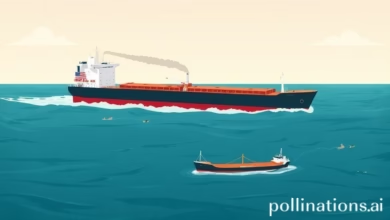Assessing the Environmental Impact of Oil: Addressing Spills, Emissions, and Sustainable Alternatives in the Global Oil Trade

The environmental impact of oil is a pressing issue that resonates across the globe, influencing not just ecological systems but also economic and geopolitical landscapes. From catastrophic oil spills that devastate marine ecosystems to harmful emissions released during oil refining and transportation, the repercussions of crude oil extraction and consumption are profound. As the world grapples with the realities of climate change, understanding these impacts has never been more crucial. The oil market trends, driven by organizations like OPEC and the dynamics of global oil trade, further complicate the picture, as they often prioritize energy security and oil price stability over environmental concerns. This article delves into the multifaceted environmental challenges posed by oil, examining not only the immediate repercussions of oil spills and emissions but also the broader implications of oil geopolitics and consumption patterns. Additionally, we will explore viable alternatives to crude oil, such as biofuels and emerging oil technologies, that could pave the way for a more sustainable future. Join us as we unravel the complexities of oil’s environmental impact and the steps needed to mitigate its effects on our planet.
- 1. The Environmental Impact of Oil: Understanding Oil Spills, Emissions, and Ecological Damage
- 2. Oil Market Trends: The Role of OPEC and Global Oil Trade in Environmental Challenges
- 3. Alternatives to Crude Oil: Exploring Biofuels and Emerging Oil Technologies for a Sustainable Future
1. The Environmental Impact of Oil: Understanding Oil Spills, Emissions, and Ecological Damage
The environmental impact of oil is a pressing concern that encompasses various aspects, including oil spills, emissions, and ecological damage. Oil, particularly crude oil, serves as a crucial energy source worldwide, yet its extraction and transportation come with significant risks. Oil spills, which occur during offshore drilling or through transportation mishaps, can devastate marine ecosystems, leading to long-lasting damage to wildlife and habitats. These spills often result in contamination of water sources, adversely affecting not only aquatic life but also communities reliant on these ecosystems for their livelihoods.
In addition to spills, oil refining processes contribute to harmful emissions that impact air quality and climate change. The burning of fossil fuels, including oil, releases greenhouse gases, exacerbating global warming and leading to more extreme weather patterns. As the oil market trends shift, there is increasing pressure on OPEC and other producers to balance oil prices with environmental responsibilities. The ongoing debate over energy security and the reliance on oil consumption emphasizes the need for sustainable solutions.
Furthermore, the extraction process, particularly in oil sands and shale oil regions, poses significant ecological risks. The development of these resources often leads to habitat destruction and increased carbon footprints. The oil supply chains, from exploration to storage and transportation, require stringent oil regulation and compliance measures to mitigate environmental damage.
As the world looks for alternatives, biofuels and other oil alternatives are gaining traction, aiming to reduce dependency on traditional oil sources. However, these alternatives must be developed responsibly to avoid repeating the environmental mistakes of the past. Oil field services and technologies are evolving to enhance safety and reduce the ecological footprint of oil exploration and production. The complexities of oil geopolitics further complicate the landscape, as nations navigate the balance between energy needs and environmental stewardship.
In conclusion, addressing the environmental impact of oil requires a multifaceted approach that includes stringent regulations, innovative technologies, and a commitment to transitioning towards sustainable energy sources. By focusing on reducing emissions, preventing spills, and considering the ecological consequences of oil consumption, we can work towards a more sustainable future while ensuring energy security.
2. Oil Market Trends: The Role of OPEC and Global Oil Trade in Environmental Challenges
The oil market trends significantly influence the environmental impact of oil, particularly through the roles of OPEC and the global oil trade. As a major player in the oil industry, the Organization of the Petroleum Exporting Countries (OPEC) has the power to dictate oil production levels, which directly affects oil prices and, consequently, oil consumption patterns. When OPEC decides to cut production, it can lead to higher oil prices, which may incentivize countries to explore alternative sources of energy or invest in oil alternatives such as biofuels and natural gas. Conversely, when oil production increases, often in response to geopolitical tensions or rising demand, the environmental repercussions can be severe, including increased emissions from oil refining and transportation.
Global oil trade is also a key factor in environmental challenges. The transportation of crude oil through pipelines and tankers poses risks of oil spills, which can have devastating effects on marine and terrestrial ecosystems. Furthermore, the expansion of offshore drilling and oil exploration into sensitive areas raises concerns about ecological damage and biodiversity loss. The reliance on oil reserves, particularly in politically unstable regions, complicates energy security and can lead to more aggressive oil geopolitics, further exacerbating the environmental impact of oil.
As the demand for oil increases, downstream oil processes such as oil refining and petrochemicals contribute to greenhouse gas emissions and other pollutants. The impact of oil consumption on climate change cannot be overstated, as it is a significant source of carbon dioxide emissions. The industry must also grapple with oil regulation and compliance, which are crucial for mitigating environmental damage. Innovative oil technologies and practices in oil field services can help reduce the ecological footprint of oil operations, but these advancements require substantial investment.
The ongoing evolution of the oil market, including trends in shale oil production and changing dynamics in oil supply chains, will continue to shape the environmental landscape associated with fossil fuels. As investors consider oil price hedging strategies, they must weigh the long-term implications of their investments on the environment and the potential shift towards more sustainable energy sources. Ultimately, addressing the environmental impact of oil necessitates a comprehensive understanding of these market trends and a commitment to pursuing cleaner alternatives in the face of escalating oil consumption.
3. Alternatives to Crude Oil: Exploring Biofuels and Emerging Oil Technologies for a Sustainable Future
As the world grapples with the environmental impact of oil, particularly from crude oil extraction and transportation, exploring alternatives becomes crucial for a sustainable future. Biofuels have emerged as one of the most promising oil alternatives, offering a renewable source of energy that can significantly reduce greenhouse gas emissions compared to traditional fossil fuels. These biofuels, derived from organic materials such as plant oils and animal fats, are increasingly being integrated into the global oil trade, helping to diversify energy sources and enhance energy security.
Emerging oil technologies are also playing a vital role in reducing reliance on crude oil. Innovations in oil refining processes, such as advanced bio-refining techniques, are improving the efficiency of converting biomass into usable fuels while minimizing waste and emissions. Furthermore, the development of synthetic fuels, created through the conversion of natural gas or biomass into liquid hydrocarbons, presents an attractive option for reducing oil consumption without compromising on energy needs.
The current trends in the oil market, influenced by OPEC's production policies and fluctuations in oil prices, highlight the necessity for sustainable alternatives. As oil prices rise and the geopolitical landscape shifts, investments in biofuels and other renewable energy sources are becoming increasingly favorable. This shift not only addresses the environmental impact of oil but also aligns with the growing demand for compliance with stricter oil regulations aimed at mitigating ecological damage.
Oil field services are also evolving, with a focus on sustainable practices that reduce the environmental footprint of oil exploration and production. By investing in oil technologies that promote cleaner methods of extraction and transportation, the industry can work towards a more sustainable model. In conclusion, as we navigate the complexities of oil geopolitics and the global oil supply chains, the exploration of biofuels and emerging oil technologies offers a pathway to a more sustainable energy future, balancing economic needs with environmental responsibility.
In conclusion, the environmental impact of oil is a multifaceted issue that demands urgent attention and action. From devastating oil spills to harmful emissions and significant ecological damage, the consequences of crude oil consumption extend far beyond the immediate vicinity of oil extraction and transportation. Understanding the intricate dynamics of oil market trends, including the influence of OPEC and the complexities of global oil trade, helps shed light on the challenges we face in achieving energy security while safeguarding our planet.
As we navigate these challenges, exploring alternatives to crude oil, such as biofuels and emerging oil technologies, is essential for a sustainable future. Transitioning to cleaner energy sources can mitigate the adverse effects of oil refining and consumption, while innovations in oil field services and oil transportation can enhance compliance with environmental regulations.
Investing in oil alternatives and embracing advancements in oil exploration and storage can pave the way for a more sustainable energy landscape. To truly address the environmental impact of oil, collaboration across industries, governments, and communities is crucial. By prioritizing sustainable practices and responsible oil management, we can protect our ecosystems while ensuring economic stability in the evolving oil market.
As we move forward, let us remain committed to reducing our reliance on fossil fuels and seeking solutions that promote a healthier planet for future generations. The path to a sustainable energy future is not only a possibility but a necessity.





